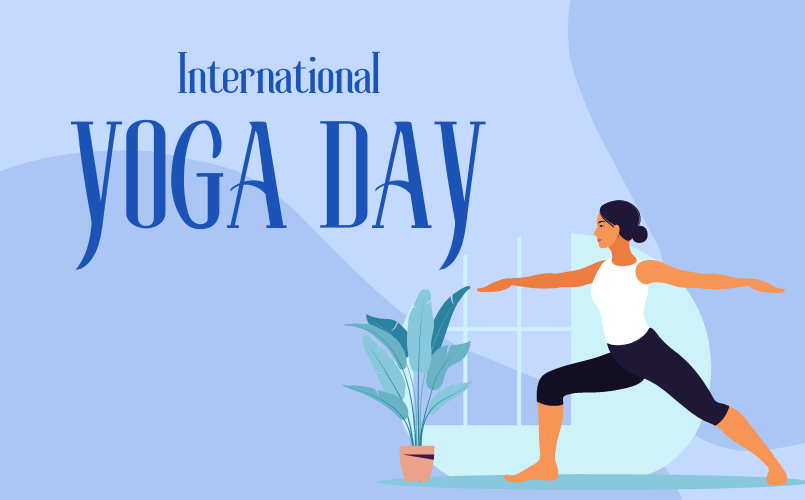The role of India in promoting International Yoga Day
The journey of making yoga a global phenomenon was spearheaded by India. Picture this: in 2014, in the grand hall of the United Nations General Assembly, Prime Minister Narendra Modi, passionately proposed the idea of an International Yoga Day. His words resonated with the global community, inviting them to embrace yoga, a gift of India to the world, promising harmony and inner peace. The world listened, and 175 out of 193 UN member states enthusiastically supported the proposal.
Significance of June 21st: The Summer Solstice
In the pages of history, it’s not every day you see such rapid acceptance of a cultural idea. This acceptance shines a light on yoga’s universal appeal and the value it adds to our lives. The proposed date, June 21st, the summer solstice, added even more weight to the movement.
June 21st, the longest day in the Northern Hemisphere, is not just another day in the calendar. In yoga’s spiritual wisdom, it marks a phase of transition, an opportunity for us to evolve, and connect with our higher selves. On this day, it is believed, the sun begins its journey from the southern to the northern hemisphere, symbolizing the path of enlightenment and self-realization, core principles of yoga.
International Yoga Day reminds us that yoga is not just about stretching our bodies, but also about expanding our minds and nurturing our spirits. As life’s challenges bear down on our physical and mental well-being, yoga offers an escape, a chance to enhance our resilience, focus, and happiness.
Let’s contemplate the profound words of a wise sage,
Yoga is the journey of the self, through the self, to the self.
Even today, this wisdom holds true, reminding us of the transformative power of yoga in our lives. From fostering self-discipline to improving concentration, yoga plays a vital role in our personal development. And, interestingly enough, research has shown that regular practice of yoga can give a significant boost to academic performance and interpersonal relationships among students – a noteworthy piece of information for parents nurturing their children’s holistic growth.
Historical roots of Yoga in ancient civilizations
Each year, as we come together to celebrate International Yoga Day, we journey back in time, immersing ourselves in the rich cultural tapestry from which yoga emerged. Picture a civilization thriving around 3000 BCE in the fertile basin of the Indus Valley. Unearthed artifacts and inscriptions from this era, such as those found in Mohenjo-Daro, reveal figures striking yoga-like poses, whispering tales of a time when yoga was an integral part of daily life.
The evolution of yoga is a story written over centuries, with sage Patanjali playing a pivotal role. Often referred to as the ‘father of yoga’, Patanjali’s monumental work, the ‘Yoga Sutras’, penned around 400 CE, offers us a systematic exploration of yoga’s philosophy. His teachings delineated the eight-fold path, or ‘Ashtanga’, laying the foundation for the yoga we practice and cherish today.
The journey of Yoga from East to West
Our story does not end in the East. The narrative of yoga stretches across continents, painting a fascinating tale of cultural exchange and transformation. In the late 19th and early 20th centuries, the Western world began to take notice of yoga, thanks to influential figures like Swami Vivekananda. He served as a cultural bridge, bringing the wisdom of Vedanta and Yoga from the East to the West.
Enhancing Concentration and Wellness
This journey of yoga wasn’t simply a cultural exchange, it sparked a revolution. It dismantled barriers, creating a global stage for yoga and expanding its scope beyond spiritual practice. The West embraced yoga’s diverse benefits, physical, mental, and spiritual, integrating it into various sectors like healthcare, education, and corporate wellness.
Bringing this closer to our everyday lives, let’s consider yoga’s impact on education. Research has shown that yoga can significantly enhance students’ physical health, emotional balance, and academic prowess.
As we mark International Yoga Day, let’s turn our focus to the immense benefits of yoga for students. This ancient tradition, enriched with wisdom, serves as a silent partner, bolstering students with the resilience they need to navigate academic challenges.
Benefits of Yoga for cognitive development
The cognitive development of a student, a cornerstone of their academic journey, is significantly bolstered by yoga. Practices such as meditation and Pranayama, or breathing exercises, stimulate the prefrontal cortex, the area of the brain responsible for functions like decision making, focus, and learning. Over time, yoga becomes an invaluable ally, helping students absorb and retain knowledge more efficiently, and in turn, enhancing their academic performance.
Yoga in reducing academic stress
In the whirlwind of today’s demanding academic environment, stress can become an unwelcome companion. The pressure to excel in academics and extracurricular activities can birth anxiety, sleep disorders, and health issues. Yoga, a practice rooted in mindfulness and relaxation, can serve as an effective stress reliever. Certain yoga poses, paired with deep breathing exercises, can dial down the body’s stress response, promoting a sense of calm and peace.
Role of Yoga in promoting a balanced lifestyle among students
In addition, yoga plays a significant role in promoting a balanced lifestyle among students. It silently instills discipline, improves time management, and fosters mindfulness, thereby nurturing healthier eating and sleeping habits. For instance, the practice of ‘Savasana’ or the ‘Corpse Pose’ encourages complete relaxation and has been known to improve sleep quality, a vital ingredient for academic success and overall well-being.
In the realm of health, yoga has a holistic approach, akin to the ancient adage, “a healthy mind resides in a healthy body”. It doesn’t merely improve physical flexibility but also cultivates mental resilience and emotional stability. According to a study published in the International Journal of Yoga, yoga can significantly uplift students’ emotional health, making them less prone to anxiety and depression.
Practicing yoga also cultivates essential life skills such as empathy, patience, and resilience, which are crucial in shaping an individual’s character. As the renowned Swami Vivekananda once stated,
You have to grow from the inside out. None can teach you, none can make you spiritual. There is no other teacher but your own soul.
International Yoga Day provides an opportunity to recognize the numerous ways yoga can enrich our children’s academic journey. It offers them the gifts of balanced wellness, sharpened focus, and resilient strength. It brings to life the true essence of education – not merely the accumulation of facts, but the pursuit of holistic development and lifelong learning – principles that yoga embodies.
Therefore, celebrating International Yoga Day goes beyond acknowledging an age-old Indian practice. It invites us to welcome a life philosophy that harmoniously blends health, personal growth, and ancient wisdom. As we journey through this day, we are reminded of yoga’s timeless wisdom and its universal relevance. So, let’s take this opportunity to start our own journey of self-discovery, one yoga pose at a time.




